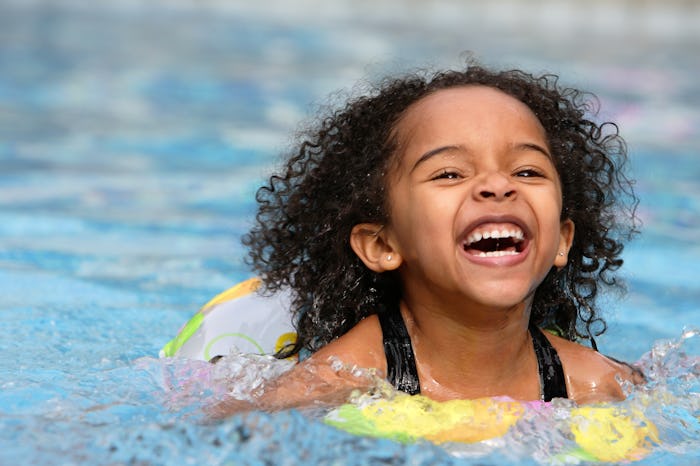Summer

How Coronavirus Stands Up To A Chlorinated Swimming Pool
Spoiler alert: it’s not a bad place to splash and feel safe.
The scent of the pool during the summer is one of my favorite smells. As a former lifeguard, it smells clean to me. Still, you have to wonder if the pool really is always clean. My whole life, I’ve been told that there are a few things that chlorine doesn’t kill, and with the threat of COVID-19 still lingering, I can’t help but wonder if chlorine can wipe out traces of coronavirus.
It was a very long winter where many of us were stuck in isolation and quarantine, and now the light at the end of the tunnel finally seems to be here: many people are getting the COVID vaccine, social distancing guidelines are lifting, and we’re all excited to go back to everyday life. Spending a few hours lazing about the pool with an icy beverage sounds just about perfect. But even though the threat has lessened, you have to think about how safe it is.
Infectious disease physician and vaccination specialist Dr. Jonas Nilsen tells Romper that while The Centers for Disease control and Prevention (CDC) has put out a mandate stating that "the chance of COVID-19 to manifest in swimming pools, spas, jacuzzis, etc. is very low as they are treated with chlorine and bromine," it's the lack of social distancing in and around the pools that is dangerous. "Although COVID-19 most likely will not transmit through these places, it is difficult to keep a safe distance to other people," Nilsen says. If you aren’t vaccinated or you’re in a high-risk group, you may want to reconsider spending time in a crowded public pool.
Just what you want to hear, right? But there is some good news — with a catch. Dr. Benjamin Caplan, MD, founder and chief medical officer at CED Clinic, tells Romper that chlorine can kill viruses like the coronavirus. “The active ingredient in bleach, one of the most commonly used agents to clean surfaces, is chlorine,” Dr. Caplan explains. “With respect to pools, both public and private, the devil’s in the details. All pools must be regularly maintained, cleaned, and have operating circulation to sustain the healthy effects of chlorine. If the pH and alkalinity of a pool is not appropriately tuned, if walls, steps, ladders, and other touched surfaces are not brushed regularly, and if there is not adequate air ventilation and circulation, there is still a meaningful risk of contracting an infectious agent like coronavirus.”
Basically, chlorine should kill the coronavirus, as long as the pool is properly taken care of, and the real threat of contracting COVID comes from the potential lack of social distancing around the pool rather than the actual pool itself. Physician and educator Leann Poston of Invigor Medical tells Romper essentially the same thing as Dr. Nilsen: "It is true that the CDC has stated that chlorine and bromine both kill COVID and therefore there should not be any risk of the person-to-person spread of COVID in the swimming pool," but that you can't be truly safe if you're interacting in the same environment as strangers in close distance.
Even though social distancing guidelines are being lifted, this is still something you should keep in mind, especially if you’re bringing children, who can’t be vaccinated yet, to a pool. Dr. Caplan notes that coronavirus can be transmitted through touch and airborne particles, noting, “Even if pools are adequately maintained with healthy levels of chlorine, infected saliva particles from coughs, heavy breathing, and sneezing can still enter an innocent host through inhalation. Children playing and screaming in pools, throwing toys and jumping in and out, can unknowingly spread particles into the air that may infect unvaccinated subjects.”
In other words: if you’re very concerned about an unvaccinated child or adult getting sick at a pool, avoid crowded public pools and only go to pools you trust. Dr. Caplan says that typical cloth masks shouldn’t be worn while swimming, but they can be worn while you’re out of the water. He still recommends social distancing, hand-washing, and avoiding touching the face. “Parents should inquire about regular testing and maintenance of the pool chemistry, circulation and ventilation, and should be mindful of pool personnel limits to avoid overall risk of exposure,” he adds.
Dr. Nilsen takes it one step further, saying that in order to keep your home pool safe you should "make sure to maintain a safe cleaning of your private swimming pool. You can use Free Chlorine in a concentration between 2.0 to 4.0 mg/L — minimum 1.0 mg/L — or Total Bromine in a concentration of 4.0 to 6.0 mg/L — minimum 2.0 mg/L. If you maintain your swimming pool by disinfecting it with this kind of product, the virus will be removed or inactivated." And yes, that is going to make your pool smell a bit like a bleach pit, and it's not going to be easy on the hair, but it's worth it. Might I suggest a swimming cap and immediate shower?
Experts:
Physician and educator Leann Poston M.D., M.B.A., M.Ed. of Invigor Medical
This article was originally published on